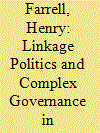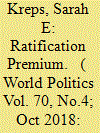|
|
|
Sort Order |
|
|
|
Items / Page
|
|
|
|
|
|
|
| Srl | Item |
| 1 |
ID:
161967


|
|
|
|
|
| Summary/Abstract |
In Latin America, the relationship between income and support for redistribution is weak and variable despite the region's extreme income inequality. This article shows that this condition is rooted in the truncated structure of many Latin American welfare states. Heavy spending on contributory social insurance for formal-sector workers, flat or regressive subsidies, and informal access barriers mean that social spending does far less for the poor in Latin America than it does in advanced industrial economies. Using public opinion data from across Latin America and original survey data from Colombia, the author demonstrates that income is less predictive of attitudes in the countries and social policy areas in which the poor gain less from social expenditures. Social policy exclusion leads the poor to doubt that they will benefit from redistribution, thereby dampening their support for it. The article reverses an assumption in political economy models that welfare exclusion unleashes demands for greater redistribution. Instead, truncation reinforces skepticism about social policy helping the poor. Welfare state reforms to promote social inclusion are essential to strengthen redistributive coalitions.
|
|
|
|
|
|
|
|
|
|
|
|
|
|
|
|
| 2 |
ID:
161966


|
|
|
|
|
| Summary/Abstract |
Globalization blurs the traditional distinction between high and low politics, creating connections between previously discrete issue areas. An important existing literature focuses on how states may intentionally tie policy areas together to enhance cooperation. Building on recent scholarship in historical institutionalism, the authors emphasize how the extent of political discretion enjoyed by heads of state to negotiate and implement international agreements varies across issue areas. When policy domains are linked, so too are different domestic political configurations, each with its own opportunity structures or points of leverage. Opening up the possibility for such variation, the article demonstrates how actors other than states, such as nonstate and substate actors, use the heterogeneity of opportunity structures to influence negotiations and their institutional consequences. The authors examine the theory's purchase on international cooperation over intelligence, privacy, and data exchange in the transatlantic space in the wake of the terrorist attacks of September 11, 2001, and the revelations made public by Edward Snowden in 2013. The findings speak to critical international relations debates, including the role of nonstate actors in diplomacy, the interaction between domestic and international politics, and the consequences of globalization and digital technologies for the relationship between international political economy and security.
|
|
|
|
|
|
|
|
|
|
|
|
|
|
|
|
| 3 |
ID:
161968


|
|
|
|
|
| Summary/Abstract |
This article examines the relationship between mass resettlement and political conflict. The author theorizes that states can use mass resettlement to extend control over contested frontiers. Settlers whose land rights are politically contested will disproportionately participate in violence to defend the incumbent regime. The theory is tested using data on resettlement and violence in postcolonial Rwanda. The author shows that the Hutu revolutionary regime resettled some 450,000 Hutus after independence to frontier and Tutsi-dominated areas to defend itself against external Tutsi militias. The author contends that the invasion of the Tutsi-led Rwandan Patriotic Front (RPF) in the 1990s threatened the Hutu settler population because the RPF sought the repatriation of Tutsis onto redistributed land and that consequent land insecurity incentivized violence against Tutsis in 1994. The article identifies the positive effect of resettlement on locality violence during the genocide via a geographic regression discontinuity design. A process tracing of one notoriously violent resettled commune supports the theorized causal sequence. In light of these findings, the author suggests that research should refocus on the way that conflict shapes ethnic demography and that, to understand participation in state-sponsored violence, scholars should attend to the threat posed by regime change to individual livelihoods.
|
|
|
|
|
|
|
|
|
|
|
|
|
|
|
|
| 4 |
ID:
161965


|
|
|
|
|
| Summary/Abstract |
This article examines the effect of leaders’ foreign policy preferences on their ability to pursue and ratify arms control agreements. Does it take a “Nixon to go to China,” with hawks more effective than doves, when it comes to the domestic politics of treaty ratification? The authors observe that the theoretical logic correctly identifies an asymmetry between hawkish and dovish presidents, with the latter facing a credibility gap in advocating arms reductions. Although existing accounts assume leaders are captives of their type, the authors argue that dovish executives can overcome their credibility gap by obtaining the endorsement of informed legislators. These executives do so by paying a ratification premium, usually in the form of increased defense effort in areas not covered by the treaty. As a result, doves do not necessarily face a lower rate of success at the ratification stage; their disadvantage manifests itself primarily in the higher premium needed to obtain the same level of support as hawkish executives. The article demonstrates this argument through a formal model and tests the implications with paired comparisons of major arms control treaties in the Cold War and post–Cold War periods. The argument helps to resolve the Nixon-to-China theoretical debate. It shows that dovish leaders are not necessarily captives of their type because they can deploy side payments to achieve their policy goals. It also explains important puzzling features of the arms control record.
|
|
|
|
|
|
|
|
|
|
|
|
|
|
|
|
|
|
|
|
|